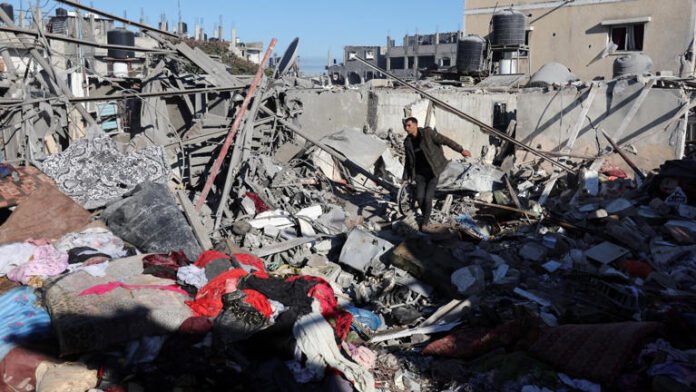The United States issues a stern condemnation of Israel’s actions in Gaza. Amidst a deepening push into the Rafah region, the U.S. has labeled Israel’s maneuvers as a ‘violation’ of international law. The escalation in Gaza not only underscores the complex geopolitical dynamics at play but also reignites longstanding debates surrounding the Israeli-Palestinian conflict and the quest for a lasting peace in the region.
The recent developments in Gaza, particularly the intensified Israeli military operations in the Rafah region, have raised alarm bells among international observers. The United States, traditionally a staunch ally of Israel, has taken the unusual step of criticizing its actions, citing concerns over potential violations of international law. This condemnation marks a notable departure from the previous administration’s unwavering support for Israel, signaling a recalibration of U.S. foreign policy in the region.
The push into Rafah comes against the backdrop of heightened tensions between Israel and Hamas, the militant group that governs the Gaza Strip. The region has been a flashpoint for violence and conflict for decades, with recurring cycles of hostilities exacerbating the humanitarian crisis facing the Palestinian population. The latest escalation threatens to further destabilize an already volatile situation and has sparked widespread calls for de-escalation and dialogue.
The U.S. condemnation of Israel’s actions in Gaza reflects growing international scrutiny of its military operations and treatment of Palestinian civilians. While Israel maintains that its actions are necessary for national security and self-defense, critics argue that they constitute disproportionate use of force and disregard for civilian lives. The civilian toll of the conflict, including casualties and displacement, has drawn condemnation from human rights organizations and prompted calls for accountability.
The Israeli-Palestinian conflict remains one of the most intractable and divisive issues in international politics, defying attempts at resolution and perpetuating cycles of violence and suffering. Efforts to negotiate a comprehensive peace agreement have been hampered by deep-rooted historical grievances, competing territorial claims, and entrenched political interests. Despite occasional diplomatic initiatives and peace talks, a durable solution to the conflict remains elusive, leaving millions of Palestinians and Israelis trapped in a cycle of despair and insecurity.
The U.S. condemnation of Israel’s actions in Gaza underscores the broader challenge of balancing support for Israel’s security with respect for Palestinian rights and aspirations. As a key ally and mediator in the region, the United States plays a pivotal role in shaping the trajectory of the Israeli-Palestinian conflict and advancing efforts towards a just and lasting peace. The recent shift in U.S. rhetoric reflects a growing recognition of the need for a more balanced and nuanced approach to the conflict, one that prioritizes the principles of international law, human rights, and justice for all parties involved.
In the face of escalating violence and mounting humanitarian concerns, the international community must redouble its efforts to promote dialogue, reconciliation, and mutual understanding between Israelis and Palestinians. Sustainable peace in the region can only be achieved through genuine engagement and meaningful negotiations that address the underlying grievances and aspirations of both sides. The recent U.S. condemnation of Israel’s actions in Gaza should serve as a wake-up call for all stakeholders to recommit themselves to the pursuit of peace and justice in the Middle East.
In addition, the United States’ condemnation of Israel’s actions in Gaza marks a significant development in the Israeli-Palestinian conflict and underscores the urgent need for de-escalation and dialogue. As tensions in the region continue to escalate, the international community must redouble its efforts to promote a just and lasting peace that respects the rights and aspirations of both Israelis and Palestinians. Only through concerted action and genuine engagement can the cycle of violence and suffering be brought to an end, paving the way for a brighter and more secure future for all.

